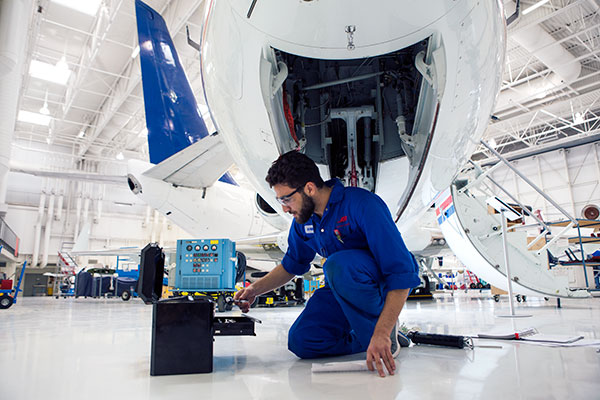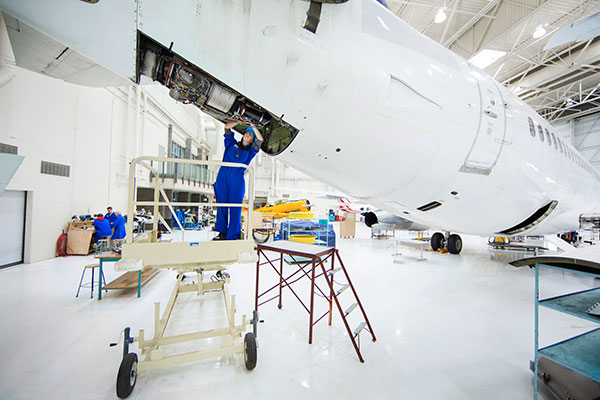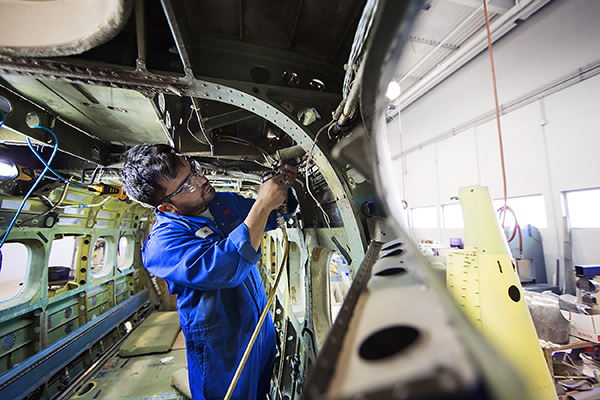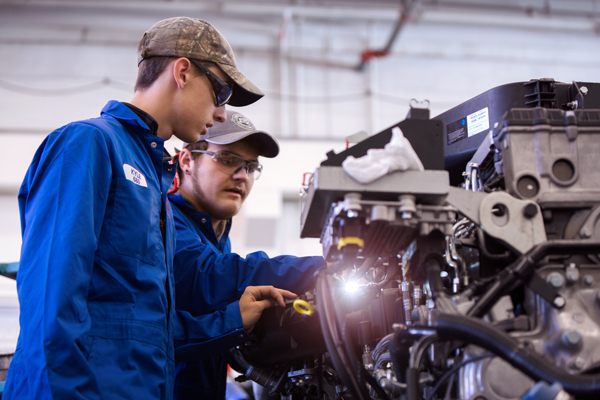On this page:
Overview
Play a crucial role in the aviation sector, ensuring the safety and reliability of aircraft operations. The Aircraft Maintenance Engineers Technology program is designed to equip you with the knowledge and practical skills necessary for a successful career in aircraft maintenance.
Work towards your Aircraft Maintenance Engineer “M” (AME) license. As a licensed AME, you’ll be entrusted with the maintenance, repair, and overall upkeep of various aircraft, such as general aviation planes, corporate jets, charter aircraft, transport-category aircraft, helicopters, and airliners.
Throughout this two-year diploma program, you’ll be immersed in a comprehensive curriculum that covers all facets of aircraft maintenance. The program is not just theoretical. Get hands-on training that prepares you for real-world challenges. Classes are at the Art Smith Aero Centre for Training and Technology at the Calgary International Airport.
In this program, you will:
- learn the fundamentals of aerodynamics, including the principles of flight and how various forces act on an aircraft
- learn about the electronic systems used in aircraft, such as navigation, communication, and auto-flight systems
- gain knowledge of engine, electrical, environment control, flight control, hydraulic, fuel, landing gear, and other mechanical systems crucial for aircraft operation
- learn about structural materials and hardware used in aircraft manufacturing, including metals, composites, and fasteners
- train in safety protocols and procedures to maintain a safe working environment
- develop troubleshooting and diagnostics techniques for identifying and resolving aircraft mechanical and electrical issues
- learn preventive maintenance inspection techniques for regular maintenance to prevent issues and ensure aircraft longevity and safety and methods for conducting thorough inspections to ensure airworthiness
- acquire the ability to accurately read and interpret technical manuals and blueprints, including engineering drawings, maintenance manuals, and blueprints.
The program also offers web-based courses, which offer you flexibility. Online modules are facilitated in one of the computer labs at the Art Smith Aero Centre.
If you are passionate about aviation, have a knack for problem-solving, and aspire to be part of a team that ensures millions of people travel safely, the Aircraft Maintenance Engineers Technology program could be the first step toward a fulfilling job or career in this essential industry.
Aircraft maintenance engineers tend to be objective, innovative, and methodical.
You need:
- confidence
- mechanical aptitude
- good eyesight and hearing
- hand-eye and muscle coordination
- fitness and agility for reaching and climbing
- comfort with heights
- organization and time-management skills
- attention to detail
- teamwork skills
- decision-making skills, often under pressure
- spatial and form awareness.
The opportunity to advance your education by transferring into this program or gain credit for previous postsecondary courses may be available.
There may also be opportunities to further your education once you graduate.
Learn more about program and institution transfer options.
This program is accredited by Transport Canada, subject to periodic audits.
If you have a 95% attendance rate in classes and labs and minimum marks of 70% in each course, you will receive a Transport Canada credit of 18 months’ work experience towards the “M” category AME license.
Upon successfully completing this program, you’ll receive a SAIT Aircraft Maintenance Engineers Technology diploma.
Careers and opportunities
Each year, SAIT conducts a survey between February and April to determine the employment rate, salary and satisfaction of our newest SAIT alumni.
![]() 100% graduate employment rate
100% graduate employment rate
![]() $44,000 average starting salary
$44,000 average starting salary
Find out more about our graduate employment statistics >
Our graduates may work in the following occupations. Some careers require additional experience and education.
Associated National Occupational Classification (NOC) codes: 22313, 72020, 72404, 93200.

Career counselling and support
Unsure which career path is for you? SAIT offers career planning services to help you decide your future.
You can also get started by taking our online career finder quiz, which can help you narrow down your search based on your current skills and interests.
Finally, you can also head to Alberta alis for various tools and resources, including additional quizzes and labour market information to help you narrow down a career path.
Services and workshopsCourses
The Aircraft Maintenance Engineers Technology diploma requires 60 credits (39 courses) to complete.
The program spans two years, with two semesters each year.
| Course | Credits |
|---|---|
|
In this course the learner will study the following concepts: arithmetic, practical measurement, algebra, trigonometry and mathematical physics, as related to aircraft maintenance. |
1.5 |
|
In Reciprocating Engine Fundamentals, the learner will gain the knowledge required to maintain a reciprocating engine. The learner will also study the operation of engine accessories such as a carburetor, a fuel injection system and a magneto. |
3 |
|
In Reciprocating Engine Fundamentals the learner will gain the practical skills required to maintain a reciprocating engine. The learner will also study the operation of engine accessories such as a carburetor, a fuel injection system and a magneto. |
3 |
|
Canadian Aviation Regulations (CARs) are the regulations and standards for the aircraft industry in Canada. This course provides the learner with a basic understanding of the CARs system as an introduction to accessing and navigating within CARs. The learner will use computer-based learning and classroom theory to develop the skills they will need for using the CARs in a workplace environment. |
1.5 |
|
Aircraft Systems I introduces basic aerodynamics as it pertains to fixed wing aircraft, beginning with the control, stability and performance of aircraft in flight. The learner will design and build a section of wing and test their work in a wind tunnel defining the effects of lift and drag. The principles of hydraulic fluid and the characteristics of aviation fuels required for aircraft operations are also explored, along with the basics of aircraft landing gear design and aircraft door and window systems. |
3 |
|
Aircraft Systems II explores the design, function, operation and maintenance of airframe systems from small to large aircraft. The foundation to operate and maintain various aircraft systems is provided. |
3 |
|
Aviation Technical Records is an introduction to systems of documentation and record keeping used in aircraft maintenance. The learner will make entries in aircraft journey logs and technical logs. The learner will be required to access and use the rules and regulations found in the Canadian Aviation Regulations, as well as various aircraft manufacturer’s Instruction for Continued Airworthiness. |
1.5 |
|
This course explores and develops skills for public speaking and technical presentations. Students will focus on technical writing for reports. Students will also develop resume styles to assist them in their job searches. |
1.5 |
|
Basic Electricity for Aircraft introduces the learner to fundamental electrical terminology, laws and concepts relating to direct current applications. The learner will begin their studies with basic electron theory and study electronic circuits, control devices, power generation, motor theory and troubleshooting techniques. By the end of the course, the learner should have an understanding of and ability to troubleshoot a light aircraft power distribution system. |
3 |
|
Aircraft Electricity and Electronics will prepare the learner with the skills to troubleshoot and repair systems that involve alternating current, reactive components, AC motors and generation, circuit control and protection, as well as digital logic applications. Pre-requisites:
|
3 |
|
This course provides an overview of aircraft instrument systems including those which measure pressure, temperature, rpm and fluid quantities. The learner will also have the opportunity to explore radio system theory and aircraft radio communication systems |
3 |
|
Aircraft Navigation Systems will prepare the learner with the skills to test, troubleshoot and repair systems that involve electronic navigation systems. |
3 |
|
Aircraft Sheet Metal Basics is an introduction to the fundamentals of riveting aircraft sheet metal structures. The learner will study the theory of aircraft aluminum, rivets and toolings with emphasis placed on the development of hands-on skills through different projects. |
1.5 |
|
In this course the fundamentals of airframe design, construction, materials, processes and procedures used to manufacture aircraft will be studied. Learners will become familiar with the terms and procedures used to inspect and maintain airframe structures including wood, steel tube, composite, aluminum and fabric covering. Issues related to corrosion identification, removal and prevention along with non-destructive inspection methods, tools and techniques will also be covered. |
3 |
|
This course will enable the learner to apply the knowledge gained in the Aircraft Sheet Metal Basics course and learn additional skills required to complete sheet metal and composite projects. |
3 |
|
Helicopter Fundamentals introduces the learner to the basics of helicopter maintenance. The learner will study the rotary wing theory of flight, helicopter flight control systems, drive train systems, ground handling and servicing. Emphasis is placed on identifying and using the proper instructions for Continued Airworthiness. The classes will provide a mix of theory and hands-on practical work. |
3 |
|
Helicopter Maintenance Practices delves into more complex helicopter maintenance practices. The learner will study specific inspection and maintenance techniques. The focus will be on hands-on work, with theory lessons to support that. Topics will include vibration analysis, gearboxes maintenance, flight control adjustment and rigging, engine controls, and drive train maintenance. Pre-requisites:
|
3 |
|
This course is designed to familiarize the learner with aircraft inspection techniques and procedures common to the aviation industry. The learner will develop the skills and knowledge required to accomplish an inspection on an aircraft. Pre-requisites:
|
3 |
|
Large Aircraft Inspection is an introduction to daily inspection tasks encountered as an Aircraft Maintenance Engineer. The learner will participate in periodic and special inspections, ground run performance checks, system testing, and maintenance of aircraft, aircraft components and power plants. At the end of this course the learner will be familiar with common inspections of aircraft and aircraft components, including completion of the appropriate paperwork. Pre-requisites:
|
3 |
|
This course focuses on the Human Factors aspect of the aviation industry. The learner will analyze case studies that will help identify common factors affecting human performance. The Quality Assurance system which the aviation industry has adopted to increase safety and reliability will also be reviewed. Finally, the learner will go behind the scenes and learn how international standards and maintenance schedules were developed. |
1.5 |
|
In Aircraft Standard Practices the learner will gain hands-on experience with common hand tools, precision measuring tools and locking devices, and study the coding systems used for materials and hardware required to perform elementary maintenance tasks on aircraft. The learner will study the theory and fabrication of fluid lines and control cables, and learn basic servicing of aircraft fuel and oxygen. |
3 |
|
This course will challenge the learner with a series of tasks and exercises based on the knowledge and skills that they have attained, and are expected to bring to their employment. Evaluation of these tasks and skills will give the learner an indication of their employment readiness. Pre-requisites:
|
3 |
|
Aircraft Turbine Engine Essentials introduces the learner to the design and construction of aircraft gas turbine engines. The learner will study history, performance, systems and operation, and participate in lab experiences focusing on maintenance tasks related to routine maintenance. Pre-requisites:
|
3 |
Progression
Students must attain a PGPA and/or a CGPA of 2.0 or better in each semester and pass the necessary prerequisite courses to progress through the program. To qualify for graduation, students must pass all courses, attain a CGPA of 2.0 or better and complete course requirements within the prescribed timelines.
Admission requirements
Applicants educated in Canada
All applicants must demonstrate English language proficiency and meet the following requirements or equivalents.
- at least 50% in Math 30-1 or 30-2 and
- at least 50% in English Language Arts 30-1 or 30-2
SAIT accepts high school course equivalents for admission for applicants educated outside Alberta.
All applicants who were educated outside of Canada must demonstrate English Language proficiency and provide proof they meet the program admission requirements with an international document assessment. Find out what educational documents are accepted and assessment options.
SAIT may also accept courses completed at certain international post-secondary institutions.

Academic Upgrading
Missing an admission requirement for this program? Upgrade your prior education to help you receive admission into one of SAIT's career programs.
Upgrade
English language proficiency
All applicants must demonstrate English language proficiency prior to admission, including students educated in Canada.
Learn moreAvailable intakes
Spring 2024
Start dates:
- Domestic students: Closed
-
-
Application deadline: Feb. 23, 2024
-
- International students: Closed
-
-
Application deadline: Jan. 22, 2024
-
Fall 2024
Start dates:
- Domestic students: Closed
-
-
Application deadline: June 28, 2024
-
- International students: Closed
-
-
Application deadline: May 29, 2024
-
Winter 2025
Start dates:
- Domestic students: Waitlisted
-
-
Application deadline: Oct. 25, 2024
-
- International students: Open
-
-
Application deadline: Sept. 30, 2024
-
Costs
2024/25 tuition and fees
The following costs are effective as of July 1, 2024.
Domestic students
Books are approximately $600 for the first year and $450 for the second year.
Find your booklist on the SAIT Bookstore's website. The booklist will be available closer to the program start date. Can’t find your program or course? The bookstore didn't receive a textbook list. Contact your program directly to determine if they’re still refining course details or if you're in luck; no textbook purchase is required this term.
This is a bring-your-own-device program with a standard hardware and software requirement. See the specific requirements on our computers and laptops page.
Required equipment/tools
A tool list and timeline for purchasing the items will be provided at orientation.
Any coursework packages will also be sold at orientation.
Required personal protective equipment (PPE)
You must purchase issued coveralls, safety glasses and a respirator. These will be discussed during orientation, where you can purchase these items using debit or credit.
The required tools, personal safety equipment, and coveralls will cost approximately $1,450; however, prices vary depending on the quality and brand of tools chosen.
2023/24 tuition and fees
The following costs are effective until June 30, 2024.
Domestic students

Financial aid
Paying for your education may feel overwhelming, but we have resources and programs that can help, including information about payment options, student loans, grants and scholarships.
Learn moreApplication process
Ready to apply?
Follow our step-by-step guide to submitting a successful application.
Communication during admission
Email is the primary source of communication during the selection process. Ensure your personal email account is managed appropriately to receive our emails, files and communications. We recommend you add the transportation.info@sait.ca domain to your safe senders list or you risk missing critical email messages.

Begin your application
Apply now using the online application portal.
Ensure you have a valid Visa or Mastercard to pay the non-refundable application fee of $120 for domestic applicants or $150 for international applicants.
Apply nowInformation sessions
Prepare for a strong start in your chosen program or get the details you need to decide your future path.
Our expert staff and faculty are ready to answer your questions and provide information about the following:
- What sets SAIT apart
- An introduction to the program and area of study
- Admission requirements
- Future career paths
- Information on the earning potential and graduate employment rates.
Contact us
School of Transportation Advising
-
Phone - 403.284.8471
International Student Advising
-
Phone - 403.284.8852
-
Email - international@sait.ca
Subscribe for updates
Your journey starts here! Sign up to get important updates on:
- Construction, transportation and manufacturing programs
- Application information
- Relevant news and events




